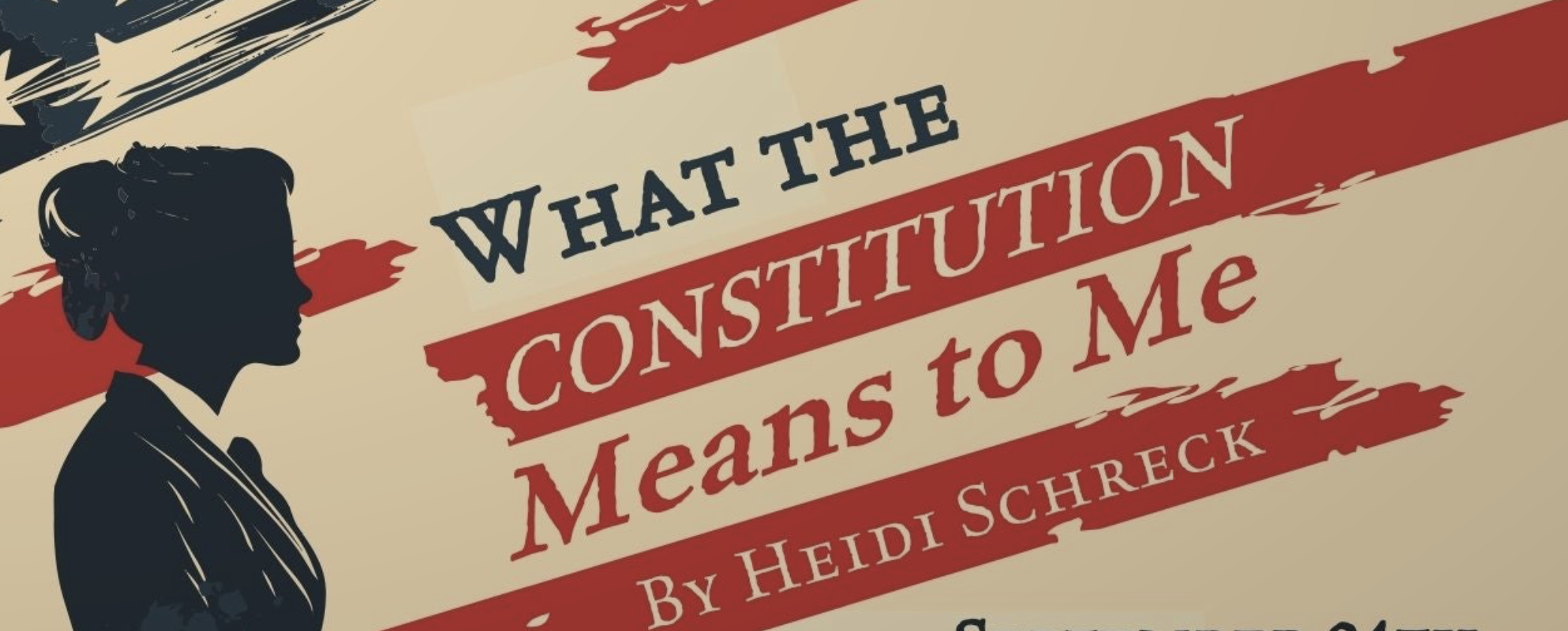Should We Rewrite the Constitution? – What the Constitution Means to Me
By Two Sues on the Aisle, Susie Rosenbluth and Sue Weston
The George Street Playhouse’s production of What the Constitution Means to Me, a 2017 American play by Heidi Schreck, was perfectly timed, running just before this year’s Presidential election. Largely autobiographical, it explores Schreck’s relationship with the Constitution, beginning in 1989 when the then-15-year-old competed in debates on the subject sponsored by the American Legion. She won frequently enough to cover her college tuition, and, in the process, developed a belief in the document’s wisdom. However, over time, her awareness of its flaws became more pronounced, and, in this play, she questions the perception of the Founding Fathers and asks whether the country should scrap the Constitution and begin again.
Join A Personal Conversation
The show, which runs approximately an hour and forty-five minutes (without intermission), opens as Heidi (played passionately by Kate Baldwin) strides down the aisle to address the audience. The series of vignettes and asides, by turns funny, nostalgic, and poignant, that make up the bulk of the play, show Heidi becoming familiar with her subject as well as her opponents and sponsors, personified by The Legionnaire (Nicholas Rodriguez), the timekeeper for the competitions. Later, the actress steps out of character to become herself, Kate Baldwin from Maplewood, New Jersey, often joined by Mr. Rodriguez, who also plays himself as a male presence in the discussion.
Allowing the actors to transform from performers to individuals effectively personalizes the stories, drawing the audience to feel part of the dialogue rather than mere spectators.
The Constitution Does Not Address Women’s Rights
Much of What the Constitution Means to Me addresses subjects that have unfortunately–and erroneously–become synonymous with left-wing causes: women’s rights, immigration, and domestic abuse. The narrative is deeply personal, sharing stories of the abuse Schreck’s mother, grandmother, and great-grandmother faced. With understandable pride, she reveals the role her mother and aunt played as whistleblowers, speaking up against abuse. Her great-grandmother, who arrived in the United States as a commodity, having been purchased as a wife through an ad in a magazine, suffered silently. Shreck faults the Constitution for failing to protect women, suggesting that America’s Founding Fathers established laws to govern a country run by men, a cultural bias reflected in our Constitution.
Research and Information
Going beyond her family’s personal stories, Shreck’s research included issues and rulings to reinforce her argument. The case of the Town of Castle Rock versus Gonzales is an example: A woman sued the local police department for failing to enforce a restraining order, which allowed her husband to abduct and murder their three children. When the case finally wound up before the Supreme Court, the justices’ decision centered around the meaning of the word “shall.” Using an audio clip of their debate, Schreck presents a glib, soulless discussion.
She objects to the Constitution’s format, which she describes as a list of negative rights, i.e. protection from unconstitutional government actions, instead of positive rights, such as ensuring certain freedoms. Her conclusion: it should be abolished and rewritten.
The Debate
She puts this proposition to the test in the play’s third segment, a staged debate with an actress playing a high-school student (Niara Beckwith or Wobirba Ekuba Sarpey). Resolved: Should we keep or rewrite the Constitution? It is a tribute to the two young actresses’ performances–as well as Laiona Michelle’s direction–that this feels unscripted–even though it undoubtedly is. The student’s argument–and her youthful exuberance–wins: the Constitution is essentially a means for good government that, perhaps, can benefit from some modifications, the process for which is contained in the document. However, we should keep the Constitution.
Dramatically, this brings the play full circle, allowing the student to display the same winning passion exhibited by Schreck when she was that age.
Our Reaction
Overall, the show’s essentially two-person performance is engaging. The characters connect with the audience, who vote on the winner of the debate. However, the final segment, devoted to the idea of the performers “getting-to-know-one-another,” including answering personal questions, makes for a less-than-satisfying ending. It unnecessarily lengthens an already drawn-out performance.
Overall, the message is strong and poignant. As written, the Constitution may well not adequately address women’s rights as they are perceived almost 250 years later. But the brilliance of the document lies in its provision for the ability to evolve. The Founding Fathers established a process for amending the Constitution, which has been used via amendments 27 times, most recently in 1992 (forbidding any law that changes the salary of members of Congress from taking effect until after the next election; they can’t give themselves a raise). The first amendments came right from the start with the Bill of Rights. While no man-made document is complete and timeless, the Constitution provides a solid foundation that can be modified.
Unsurprisingly, especially when Baldwin plays herself, her performance is real and feels genuinely extemporaneous. The shift from actors playing roles to individuals sharing stories builds intimacy and relatability. Letting the audience choose the winner of the debate between Baldwin and the student feels inspired–though we hope the outcome is always the same.
Two Sues on the Aisle bases its ratings on how many challahs (1-5) it pays to buy (rather than make) to see the play, show, film, book, or exhibit being reviewed.
What the Constitution Means to Me – 5 Challah rating
The premise and format of this provocative play and the performances showcased at the George Street Playhouse’s production make What the Constitution Means to Me worthy of Two Sue’s on the Aisle’s Five-Challah recommendation.
It is indeed worth buying five challahs–instead of making them–to see this play.
_________________________________________
Their next production
Gene & Gilda will run from December 3 – 22nd










